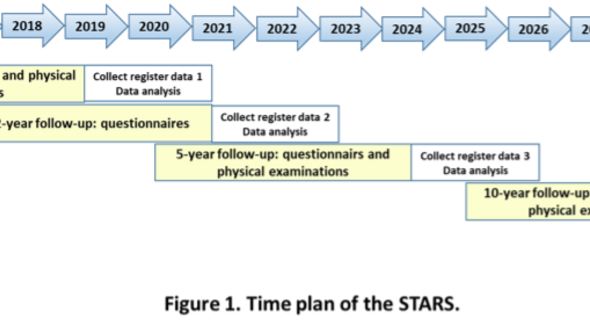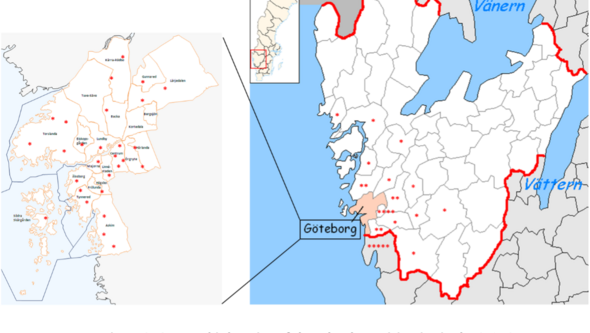STARS – Study of Adolescence Resilience and Stress
Short description
While the rising prevalence of stress and psychological issues among adolescents is widely recognized, our understanding of the causes and long-term health consequences remains fragmented. Mental health research often relies on cross-sectional analyses from questionnaire-based data, posing challenges in evaluating interventions due to a lack of causal knowledge. Our approach is to gain longitudinal data identifying relevant predictive factors (positive and negative) that determine future health and well-being.
The STARS project is an ongoing cohort study with a baseline examination at the age of 13 and follow-ups at ages 15, 18 and 23 (planned).
Aims:
To examine whether chronic stress and low resilience to stress during adolescence, predict i) obesity, ii) elevated blood pressure, and iii) mental ill-health later in life.
It is commonly acknowledged that the prevalence of stress and psychological ill-health is increasing among adolescents. However, knowledge about causes and long-term consequences is fragmented as longitudinal studies in children and adolescents that include BOTH survey of psychological health and physiological examinations are limited.
Ethnic and demographic pattern in Sweden have changed rapidly and profoundly during recent years, and long-term health consequences need to be researched. Adolescents of today are growing up in contexts of globalization, the increasing demands on education and competence on the Swedish labor market and can readily access worldwide information through the internet and social media. Furthermore, they are living in turbulent times, confronted with the COVID-19 pandemic, climate crisis, and wars and conflicts, hence creating a situation of fear and distrust. There are urgent needs to understand social, psychological and physical circumstances that may cause chronic stress in adolescents, and at the same time, to identify coping and resilient mechanisms.
Our overall aim is to test the hypothesis that chronic stress, perceived differently in adolescents with different family socioeconomic status and immigrant background, and low resilience to stress during adolescence, predict obesity and elevated blood pressure, and impaired mental health later in life.
Specifically, we study:
- risk- and resilience factors at individual-, family-, school- and neighbourhood-level that contribute to the development of stress and psychosomatic problems over time.
- association between hair cortisol concentration and self-perceived stress, whether the use of coping strategy can change this association.
- association between physical activity/sedentary behaviour, and health outcomes such as obesity, elevated blood pressure, cardiometabolic biomarkers, and perceived stress and psychosomatic symptoms in adolescents.
- BMI trajectories from birth throughout childhood, associations with health outcomes at 13 years, and timing of early-life BMI's influence on health.
- whether income inequality at neighbourhood level contributes to stress and psychosomatic symptoms in adolescents.
- consequences of the COVID-19 pandemic for mental health and educational achievement in adolescents from upper secondary education.
- consequences of children’s and adolescents’ built and living environments on their mental and physical well-being.
- the prevalence of cardiometabolic risks and mental illness in young adults at age 23 and examine how psychosocial resources affect health outcomes
- trajectories of mental health, health behaviours, and psychosocial resources across adolescence, and how these trajectories influence health in young adulthood.
- how childhood socioeconomic and personal risk factors shape adolescent trajectories, and whether adolescent trajectories mediate or moderate the effects of childhood risk factors on cardiometabolic and mental health at age 23.
About STARS
STARS is an ongoing longitudinal study (Figure 1) with a baseline survey at age 13 and three follow-ups at ages 15, 18, and 23 years (planned).
We have recruited and examined, on an individual basis, 2283 13-year-olds from 54 schools in 16 municipalities in the Västra Götaland region (Figure 2). Of these, 2149 (94%) adolescents participated in 2-year follow-up survey during autumn 2017 and spring 2021 (wave 2), and 1258 (55%) adolescents participated in the 5-year follow-up survey during 2020 and 2024 (wave 3). We are now planning the fourth follow-up (wave 4, 10 years after wave 1), which will include surveys, physiological examinations and collection of register data.
At baseline, BOTH survey of psychosocial health and physical examinations were included. We used well validated questionnaires to examine psychological well-being, self-perceived stress, psychosomatic symptoms, coping strategies, familial factors (parental education level, family structure and adolescents’ communication with parents), peer relations, experience of bullying, school satisfaction, subjective social status of their families as well as subjective social status of adolescents themselves in school. Physical examinations included BMI, blood pressure, pulse wave velocity as well as handgrip strength. Physical activity and sedentary time were measured using hip-worn ActiGraph GT3X+ accelerometers. Hair strands were collected for measuring hair cortisol concentration, a biomarker for average chronic stress for the latest 3 months. Blood samples were collected for analysis of biomarkers for inflammation. Surveys of psychosocial health were repeated at two follow-ups at ages 15 and 18 years.
Further, variables about green/blue spaces, built environments, road traffic and noise are estimated using residential GIS. Data such as growth charts and educational achievement were collected from the child and school health care database as well as Statistics Sweden.
Key publications
| Frieda Haselbach, Kirsten Mehlig, Peter Friberg, Yun Chen. Impact of neighborhood income inequality on adolescents’ mental health. Results from the STARS study. Health & Place 2025, 91: 103391. https://doi.org/10.1016/j.healthplace.2024.103391 |
| Yun Chen, Frida Dangardt, Lars Gelander and Peter Friberg. Childhood BMI trajectories predict cardiometabolic risk and perceived stress at age 13 years. The STARS cohort. Obesity 2023, DOI: 10.1002/oby.23966 |
| Johan Dahlstrand, Jonatan Fridolfsson, Daniel Arvidsson, Mats Börjesson, Peter Friberg, Yun Chen. Move for Your Heart, Break a Sweat for Your Mind: Providing Precision in Adolescent Health and Physical Activity Behaviour Pattern. Journal of Adolescent Health 2023, 73(1): 29-36. DOI: https://doi.org/10.1016/j.jadohealth.2023.03.006 |
| Yun Chen, Max Petzold, Ulrika Rüetschi, Johan Dahlstrand, Petra Löfstedt, Maria Corell, Peter Friberg. Hair glucocorticoid concentration, self-perceived stress and their associations with cardiometabolic risk markers in Swedish adolescents. Psychoneuroendocrinology 2022, 146: 105908. https://doi.org/10.1016/j.psyneuen.2022.105908 |
| Maria Corell, Yun Chen, Peter Friberg, Max Petzold, Petra Löfstedt. Does the family affluence scale reflect actual parental earned income, level of education and occupational status? A validation study using register data in Sweden. BMC Public Health 2021, 21(1): 1995. doi: 10.1186/s12889-021-11968-2 |
| Katarina Laundy, Peter Friberg, Walter Osika and Yun Chen. Mindfulness-Based Intervention for Children with Mental Health Problems: a 2-Year Follow-up Randomized Controlled Study. Mindfulness 2021, 12, 3073–3085. 10.1007/s12671-021-01771-w |
| Johan Dahlstrand, Peter Friberg, Jonatan Fridolfsson, Mats Börjesson, Daniel Arvidsson, Örjan Ekblom, Yun Chen. The use of coping strategies “shift-persist” mediates associations between physical activity and mental health problems in adolescents: a cross-sectional study. BMC Public Health 2021, 21 (1): 1104. |
| Yun Chen, Walter Osika, Göran Henriksson, Johan Dahlstrand, Peter Friberg. Impact of COVID19 pandemic on mental health and health behaviors in Swedish adolescents. Scand J Public Health. 2022, 50: 26-32. |
| Maria Corell, Peter Friberg, Petra Löfstedt, Max Petzold, Yun Chen. Subjective health complaints in early adolescence reflect stress – a study among adolescents in Western Sweden. Scand J Public Health. 2022, 50: 516-523. |

